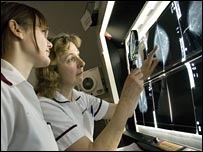Could Radiologists "Rehearsing" Positive Findings Alter Mammogram Accuracy?
by
Brendon Nafziger, DOTmed News Associate Editor | January 19, 2010

Some interesting parallels
between spotting cancer
and spotting weapons
Could looking at mammograms with cancerous lesions before starting work for the day influence how likely radiologists are to report positive findings? A new study, published in the Jan. 14 edition of Current Biology, suggests it might.
In the study, cognitive psychologists at the Visual Attention Lab at Brigham and Women's Hospital in Cambridge, Mass. had 12 subjects perform a mock airport screening task. They sat the subjects at a computer, telling them to find the "weapons" present in some of the hundreds of images that resembled X-ray screens of bags passed through airport security.
The researchers discovered that when the prevalence of the weapons in images increased from half of all slides to nearly all of them (98 percent), subjects got better at catching contraband, letting fewer items sneak through. But this came at a cost: the false alarm rate, that is, claiming to see a weapon when there was none, shot up, jumping from 15 percent to a staggering 58 percent.
But subjects didn't get a high false alarm rate by lazily rushing through the test. They actually took longer to respond to the task in slides with no weapons if the prevalence of weapons was high, as if they expected them to be there.
"If something is really rare, you might as well quit searching. But if it's always there, you really don't want to quit, you keep searching and searching," Jeremy Wolfe, Ph.D., a professor of ophthalmology at Harvard Medical School and lead author of the study, tells DOTmed News.
Dr. Wolfe compares it to rummaging around a kitchen drawer for the can-opener you usually keep there but which is actually mislaid. "You are really sure that the can opener is there, even if someone has put it someplace stupid so you spend a long time on this high prevalence search."
But if someone tells you there's a gold nugget in the drawer, "You might search a little, but you're not going to give it a lot of effort," as finding hidden treasure in kitchen drawers is, alas, a low prevalence search.
And while this response to prevalence serves people well most of the time, it might cause trouble in difficult, unnatural search tasks like those in airport security and at radiology clinics, where the target is uncommon, but a miss is catastrophic.
"It might not be what's ideal if you're looking for something like guns, bombs and knives at the airport or cancer in mammograms," says Dr. Wolfe. "Those sorts of tasks put demands on a human searcher that you're not really well built to deal with. These targets of search are rare, they're hard to find, and the society that has given you this task wants you to find them perfectly. That's a tough combination."
